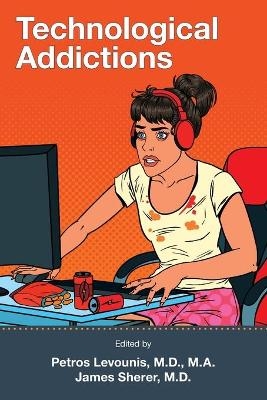
Technological Addictions
American Psychiatric Association Publishing (Verlag)
978-1-61537-293-5 (ISBN)
Technological Addictions is a wakeup call alerting the medical community—and society at large—to the addictive potential of technology and to technological addictions as legitimate psychiatric conditions worthy of medical assessment, diagnosis, and treatment. No other book tackles these addictions, individually and collectively, contextualizing them for both mental health professionals and the interested public. Petros Levounis, an authority on addiction who's been an early voice on the intersection of addiction and technology, and James Sherer are uniquely well-suited to the task, and they have recruited an impressive list of contributors who write thoughtfully, eloquently, and authoritatively on their respective topics. The 10 chapters address the different kinds of technological addiction, as well as how they manifest and impact particular populations. Core to this discussion is the fine line between addictive and nonpathological use. After all, technology makes modern life possible, so assessing whether patients have crossed that line is not an easy task.
Other noteworthy topics
• In 2019, "gaming disorder" was added to the ICD-11, a controversial move raised a difficult question: are video games addictive and harmful, or are they just another pastime? The book helps clinicians understand video games as a cultural phenomenon, analyzing both their social importance and with their addictive potential.
• Cybersex and online pornography can hijack our dopaminergic reward pathways like any other addictive substance, destroying relationships, bank accounts, and mental health. The book provides a brief history followed by a discussion of diagnostic criteria, screening tools, associations, and treatments.
• Although seemingly harmless, even social media can become addictive, as people create online personae that may confuse and undermine both their sense of self and their sense of connectedness to the world, leading to anxiety, depression, impulsivity, and ADHD. The book helps readers distinguish between healthy and pathological social media use and explores treatment options for the latter.
• Technology is an integral factor in what has become known as "information overload," which is associated with decreased performance and job satisfaction, work-related stress, social isolation, impaired sleep, relationship issues, and other problems. The book examines the underlying psychology of internet addiction and problematic internet use, their comorbidities, psychopathological models, and treatments.
• Significantly older when first introduced to the internet, older adults may face unique challenges and vulnerabilities, and this evolving understanding of the role of technology in their lives, both in terms of positive changes and the risk for pathological patterns of use and other potential harms, is explored in-depth.
Although written primarily for psychiatrists and other mental health professionals, patients, parents, teachers, students, administrators, and anyone who is interested in how humans interact with technology will find Technological Addictions fascinating and thought provoking.
Petros Levounis, M.D., M.A., is a Professor and the Chair of the Department of Psychiatry, as well as Associate Dean, at Rutgers New Jersey Medical School and Chief of Service at University Hospital in Newark, New Jersey. James Sherer, M.D., is Chief Resident in the Department of Psychiatry at Rutgers New Jersey Medical School in Newark, New Jersey.
Chapter 1. Video Games: From Harmless Pastime to Internet Gaming Disorder
Chapter 2. Cybersex and Online Pornography: Hacking the Human Sex Drive
Chapter 3. Internet Gambling: An Old Behavior in a New Age
Chapter 4. Texting, Emailing, and Other Online Messaging: When Does a Communication Tool Become a Burden?
Chapter 5. Internet Surfing and Information Overload
Chapter 6. Social Media: The Self vs. the Selfie
Chapter 7. Online Shopping and Auctions: The Ease and Sleaze
Chapter 8. Children and Adolescents: Codependence Between Youth and Tech
Chapter 9. Special Considerations for Older Adults
Chapter 10. New and Emerging Addictive Technologies: Where Do We Go From Here?
| Erscheinungsdatum | 06.08.2021 |
|---|---|
| Zusatzinfo | 1 Figures; 8 Tables, unspecified |
| Verlagsort | VA |
| Sprache | englisch |
| Maße | 152 x 229 mm |
| Gewicht | 363 g |
| Themenwelt | Medizin / Pharmazie ► Medizinische Fachgebiete ► Psychiatrie / Psychotherapie |
| ISBN-10 | 1-61537-293-8 / 1615372938 |
| ISBN-13 | 978-1-61537-293-5 / 9781615372935 |
| Zustand | Neuware |
| Haben Sie eine Frage zum Produkt? |
aus dem Bereich


